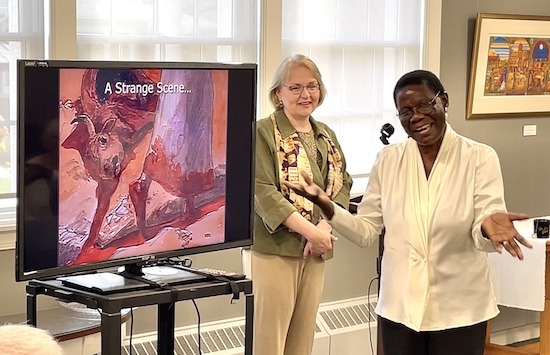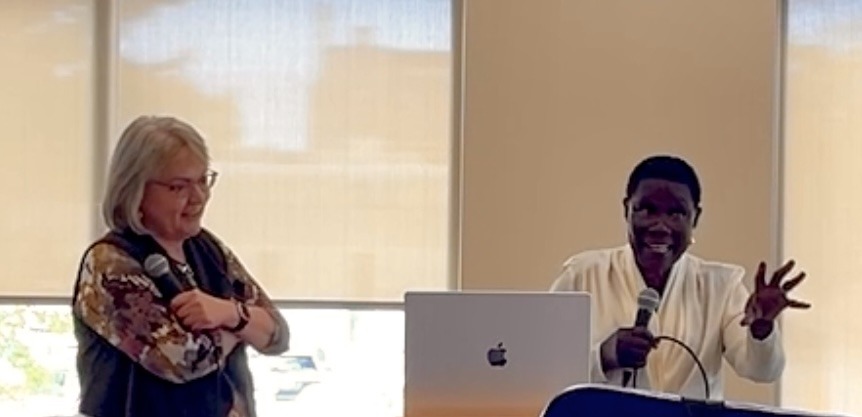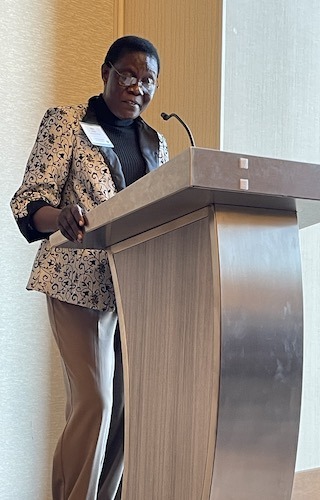
Remember in Genesis 15 when Abraham sacrificed animals to make a blood path to cut a covenant with God? You might think that you’d need to go back three thousand years to see this scene, but Rev. Dr. Milly Erema saw her family make covenants this way when she was a kid. Her traditional culture resembles that of the Ancient Near East in many ways.
Dr. Erema has since earned a Ph.D. in Old Testament and has taught Bible at Uganda Christian University for 20+ years. When she was visiting Michigan this fall, the two of us gave talks at multiple churches about her fascinating ability to “read the Bible as an insider,” a comment that her seminary professors used to make about her.
Milly also shared other thoughts from her traditional culture that surprised her American audience, especially when they reflected a more biblical perspective on life.
Surprisingly “Hebraic” Insights
Readers of my books about the Bible in its Jewish, Hebraic cultural context might wonder why I’m interested in a Ugandan scholar’s insights. It’s because of how often I see Milly’s Ugandan perspective match the Hebraic/Jewish cultural context!
 Like in the video above, Milly talks about Genesis 15, where Abram makes a blood path in order to make a covenant with God. During her talk she put in a side comment, “Actually, our people don’t make covenants, we cut covenants.”
Like in the video above, Milly talks about Genesis 15, where Abram makes a blood path in order to make a covenant with God. During her talk she put in a side comment, “Actually, our people don’t make covenants, we cut covenants.”
If you know the Hebrew of Genesis 15:18, that’s exactly what it says, that “On that day, God cut a covenant with Abram.” We translate the verb as “made,” but in Hebrew the word is karat, because the reality is that covenants are cut, (karat) not made (asah). That’s a Hebraic detail that her Ugandan culture has preserved. Probably the same verb was used in various languages across the Ancient Near East.
Centuries ago, Milly’s Lugbara people lived not far south of Egypt, in the ancient kingdom of Kush that is mentioned dozens of time in the Bible. So it’s likely that her insights are more than just coincidental.
For more about cultural insights on the Bible that I’ve learned from Dr. Milly Erema, visit this link.
Paper Given at the Evangelical Theological Society Meeting
This November, Milly and I also traveled to San Antonio to attend academic meetings in biblical studies. We attended the conferences for ETS (Evangelical Theological Society), IBR (Institute for Biblical Research) and SBL (Society for Biblical Literature).
At ETS, Milly gave a paper about how her East African traditional knowledge sheds light on Psalm 82, a puzzling psalm for Christians. Consider the text of Psalm 82:
God has taken his place in the divine council;
in the midst of the gods he holds judgment:
“How long will you judge unjustly
and show partiality to the wicked? Selah
Give justice to the weak and the fatherless;
maintain the right of the afflicted and the destitute.
Rescue the weak and the needy;
deliver them from the hand of the wicked.”
They have neither knowledge nor understanding,
they walk about in darkness;
all the foundations of the earth are shaken.
I said, “You are gods,
sons of the Most High, all of you;
nevertheless, like men you shall die,
and fall like any prince.”
Arise, O God, judge the earth;
for you shall inherit all the nations!
 Christians puzzle over how this psalm speaks of God seemingly among other gods. It sounds like some kind of polytheism is being hinted at, which the term “divine council” also suggests. Milly has an answer for this from her culture, where human leaders are spoken of as “gods” because the assumption was that the spirit of the god was speaking through them. It is as if God gives a bit of his Spirit to each person who has authority to rule or judge on his behalf.
Christians puzzle over how this psalm speaks of God seemingly among other gods. It sounds like some kind of polytheism is being hinted at, which the term “divine council” also suggests. Milly has an answer for this from her culture, where human leaders are spoken of as “gods” because the assumption was that the spirit of the god was speaking through them. It is as if God gives a bit of his Spirit to each person who has authority to rule or judge on his behalf.
This is actually not unlike what you see in the OT when kings are anointed and are filled with God’s Spirit, (1 Sam 16:13) or when the 70 elders are filled with the Spirit after Moses delegates some of his duties to them. (Numbers 11:25)
Milly sees Psalm 82 as a rebuke upon human leaders who are corrupt, who neglect the needs of their people. They may think they are gods and can act with impunity, but they will realize their humanity when they face judgment for their misdeeds when they die.
You can read her paper at the link (pdf.):
A Contextual Analysis of Psalm 82 from an African Perspective
Leave a Reply